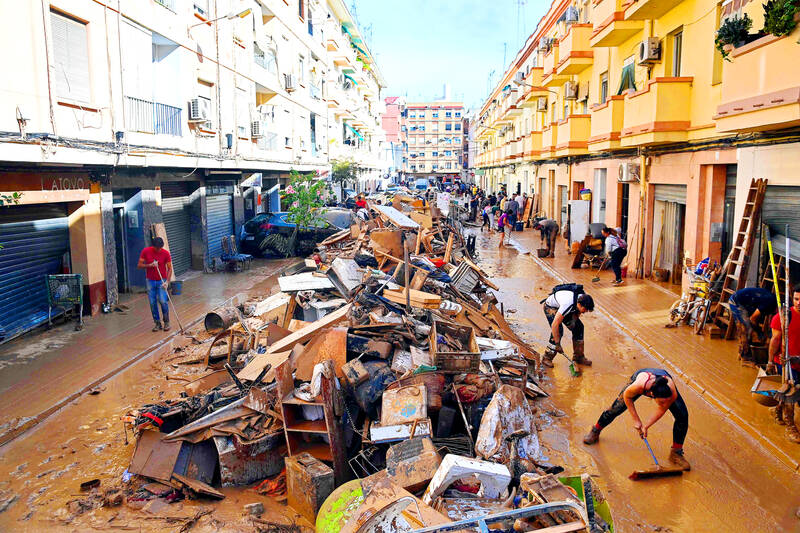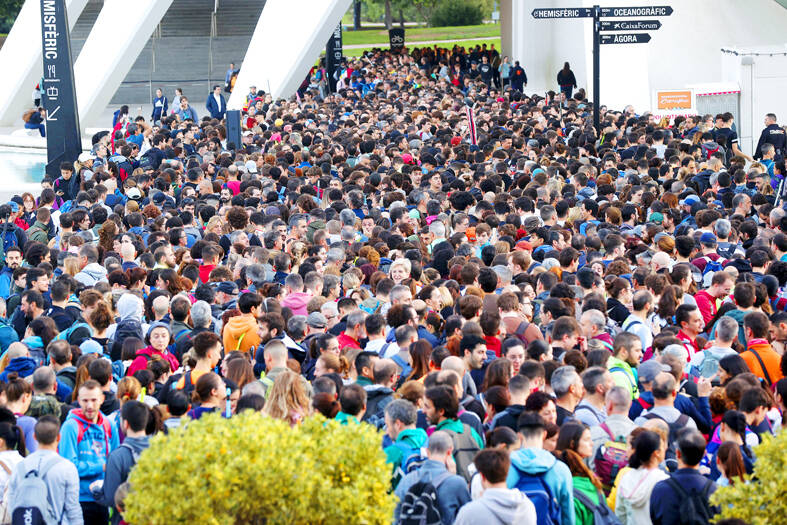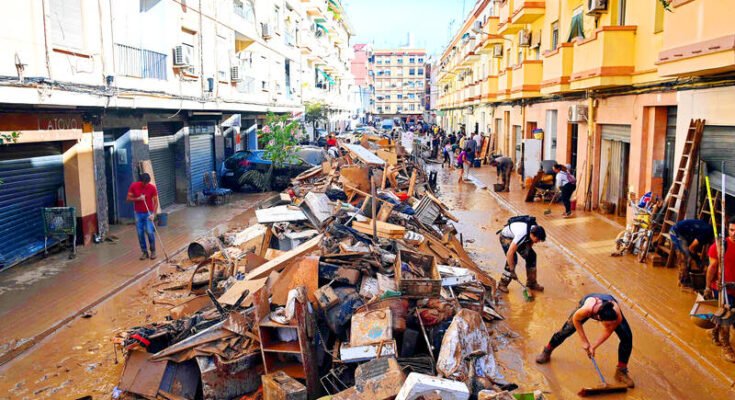‘TIME TO HELP’: Thousands of people took to the streets to help with cleanup efforts, despite warnings from officials that they could impede emergency services
AFP, VALENCIA, Spain
Rescuers yesterday resumed a grim search for bodies as Spain scrambled to organize aid to stricken citizens following devastating floods that have killed more than 200 people.
Hopes of finding survivors more than three days after torrents of mud-filled water submerged towns and wrecked infrastructure were slim in the European country’s deadliest such disaster in decades.
Almost all deaths have been recorded in the eastern Valencia region where thousands of soldiers, police officers and civil guards were frantically clearing debris and mud in the search for bodies.

People pile up debris along a street in Paiporta, Spain, on Friday, following devastating flooding in the region.
Photo: AFP
Officials have said that dozens of people remain unaccounted for, but establishing a precise figure is difficult with telephone and transport networks severely damaged.
Spanish Minister of the Interior Fernando Grande-Marlaska on Friday told Cadena Ser radio station that 207 people had died and that it was “reasonable” to believe more fatalities would emerge.
The government hopes that the estimated number of missing people would fall once telephone and Internet services are running again, he said.

Thousands of people gather at the Ciudad de las Artes y las Ciencias complex to volunteer to help in the reconstruction and cleaning of towns affected by flash floods in Valencia, Spain,yesterday.
Photo: EPA-EFE
Restoring order and distributing aid to destroyed towns and villages — some of which have been cut off from food, water and power for days — is a priority.
Authorities have come under fire over the adequacy of warning systems before the floods, and some residents have also complained that the response to the disaster is too slow.
Susana Camarero, deputy head of the Valencia region, yesterday told journalists that essential supplies had been delivered “from day one” to all accessible settlements.
However, it was “logical” that affected residents were asking for more, she added.
Authorities in Valencia have restricted access to roads for two days to allow emergency services to carry out search, rescue and logistics operations more effectively.
Thousands of people pushing shopping carts and carrying cleaning equipment took to the streets on Friday to help with the effort to clean up.
“We took what we had at home, and now it’s time to help. It’s emotional, it gives you goosebumps,” 55-year-old engineer Federico Martinez said as he clutched a shovel on his shoulder to help with cleanup efforts.
Tamara Gil did not think twice before walking the 3km of fields and industrial estates separating Valencia from Paiporta, where she works as a teacher.
Once in Paiporta, where thousands of survivors are making do without power or water, the volunteers were greeted with a dystopian scene of mud and overturned cars.
The authorities have urged people to stay at home, warning that the well-intentioned masses of volunteers risked blocking the emergency services, but the helpers kept coming, many loading bags and water containers at the municipal hall where dozens of people lined up at an aid distribution point.
Some municipalities were “overwhelmed by the amount of solidarity and food” they had received, Camarero said.
The surge of solidarity continued yesterday as about 1,000 people set off from the Mediterranean coastal city of Valencia toward nearby towns laid waste by the floods.



